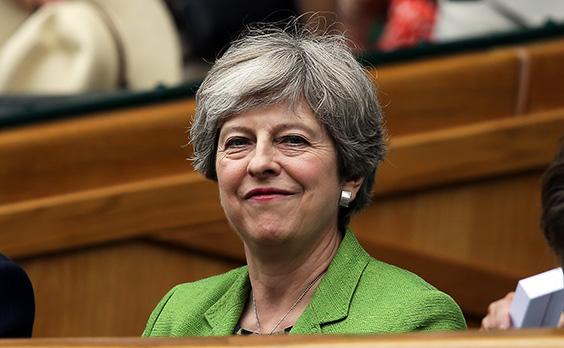Theresa May’s immigration target is leaving her increasingly isolated
I have never known a government policy supported by so few members of the Government. It is May’s target and her ministers barely pay lip service to it


Brexit is becoming a hall of mirrors. The Government wants to leave the EU customs union but then replicate it. Ministers insist that free movement will end in 2019, but say that EU nationals will still be able to come to the UK.
Irish citizens will continue to enjoy free movement as the Government seeks to recreate the existing soft border on the island after Brexit. Despite Theresa May’s notoriously tough stance on immigration, the Government said there was “no question of new immigration checks operating between Northern Ireland and Ireland”. Its position paper published on Wednesday raised lots of questions about how to stop migrants getting into Northern Ireland and the rest of the UK via Ireland but provided few answers.
The proposed two-year transitional phase after the UK leaves the EU in 2019 gives the Government breathing space to bring some sense to its wider immigration policy. Officially, May remains wedded to the discredited target to reduce net migration below 100,000 a year. But I have never known a government policy supported by so few members of the Government. It is May’s target; her ministers barely pay lip service to it.
Amber Rudd, the Home Secretary, did not even mention the target when she belatedly asked the independent Migration Advisory Committee to review EU migration last month. It might have been better if Rudd had asked these experts to look at the target, since they might well have buried it for good.
Another nail was hammered in its coffin by Ruth Davidson, the impressive leader of the Scottish Conservatives. “The time for easy slogans is over,” she wrote in The Daily Telegraph last week. “We have to ask whether the target is the right one.” She joined calls for overseas students to be taken out of the migration figures. Again, it is only May’s obstinacy which prevents her ministers doing so.
I have been writing about the “tens of thousands” goal as part of the Drop the Target campaign by The Independent and the Open Britain group, which urges a soft Brexit. It is nice to see we are not alone. The Sun, not always a bastion of liberal values, welcomed Davidson’s important intervention, saying in an editorial that the target “is a random, nonsense figure, probably impossible to achieve without damaging the economy.”
It was going to be hard for whoever followed May at the Home Office but Rudd is now making her own mark. She struck a conciliatory tone when launching the review, hinting that free movement would continue at least for the transitional period. Rudd seems to have formed a highly significant alliance with Davidson, whom she met privately in Glasgow recently. The Scottish Tory leader would probably back Rudd to also succeed May in Downing Street. (My sources tell me Davidson will not be running Jacob Rees-Mogg’s leadership campaign).
May clings to the migration target as an insurance policy against claims that she is not delivering on the demand for more control over immigration in last year’s EU referendum. But there is new evidence that she might not be as in tune with the mood of the country as she thinks.
The British Future think tank and Hope Not Hate campaign have visited the first 24 towns and cities of 60 where their “National Conversation” is holding citizens’ panels. Anyone can contribute via an online survey (www.nationalconversation.org.uk). It is part of a wide-ranging inquiry into immigration by the Commons Home Affairs Select Committee, which is aiming to find common ground in an often polarised debate.
The group discussions so far show that most people have a balanced view of immigration: there are concerns about pressures on schools, the NHS and housing, neighbourhood decline and the enforcement of immigration rules but also recognition of the benefits. Even people worried about the impact of low-skilled EU migration in their area accept the economy needs immigration. Many acknowledge that migrants keep the NHS going. While some people worry about numbers, there is support for the level of migration to remain about the same.
The findings suggest that politicians would do well to follow Davidson’s lead by spelling out the national economic benefits of migration in order to put the local pressures in context. But after feelings were whipped up by the Leave campaign last year, few Conservatives are willing to make the case.
Brexit is the right time to press the reset button on immigration. There should indeed be a national conversation about both the pressures caused by immigration and its benefits. In place of an arbitrary target that ministers admit privately will not be hit, a forward-looking new policy should be driven by the needs of the economy rather than by the politicians’ need for a headline.

Join our commenting forum
Join thought-provoking conversations, follow other Independent readers and see their replies